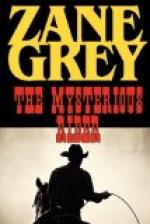“Nope.... Wils’s hoss fell on him.”
Lem broke that final news with all a cowboy’s bluntness.
“Was he hurt—Lem!” cried Columbine.
“Say, Miss Collie,” remonstrated Lem, “we’re doctorin’ up your hoss. You needn’t drop everythin’ an’ grab me like thet. An’ you’re white as a sheet, too. It ain’t nuthin’ much fer a cowboy to hev a hoss fall on him.”
“Lem Billings, I’ll hate you if you don’t tell me quick,” flashed Columbine, fiercely.
“Ahuh! So thet’s how the land lays,” replied Lem, shrewdly. “Wal, I’m sorry to tell you thet Wils was bad hurt. Now, not real bad!... The hoss fell on his leg an’ broke it. I cut off his boot. His foot was all smashed. But thar wasn’t any other hurt—honest! They’re takin’ him to Kremmlin’.”
“Ah!” Columbine’s low cry sounded strangely in her ears, as if some one else had uttered it.
“Buster Jack made two bursts this hyar day,” concluded Lem, reflectively. “Miss Collie, I ain’t shore how you’re regardin’ thet individool, but I’m tellin’ you this, fer your own good. He’s bad medicine. He has his old man’s temper thet riles up at nuthin’ an’ never felt a halter. Wusser’n thet, he’s spoiled an’ he acts like a colt thet’d tasted loco. The idee of his ropin’ Pronto right thar near the round-up! Any one would think he jest come West. Old Bill is no fool. But he wears blinders when he looks at his son. I’m predictin’ bad days fer White Slides Ranch.”
CHAPTER IV
Only one man at Meeker appeared to be attracted by the news that Rancher Bill Belllounds was offering employment. This was a little cadaverous-looking fellow, apparently neither young nor old, who said his name was Bent Wade. He had drifted into Meeker with two poor horses and a pack.
“Whar you from?” asked the innkeeper, observing how Wade cared for his horses before he thought of himself. The query had to be repeated.
“Cripple Creek. I was cook for some miners an’ I panned gold between times,” was the reply.
“Humph! Thet oughter been a better-payin’ job than any to be hed hereabouts.”
“Yes, got big pay there,” said Wade, with a sigh.
“What’d you leave fer?”
“We hed a fight over the diggin’s an’ I was the only one left. I’ll tell you....” Whereupon Wade sat down on a box, removed his old sombrero, and began to talk. An idler sauntered over, attracted by something. Then a miner happened by to halt and join the group.
Next, old Kemp, the patriarch of the village, came and listened attentively. Wade seemed to have a strange magnetism, a magic tongue.
He was small of stature, but wiry and muscular. His garments were old, soiled, worn. When he removed the wide-brimmed sombrero he exposed a remarkable face. It was smooth except for a drooping mustache, and pallid, with drops of sweat standing out on the high, broad forehead; gaunt and hollow-cheeked, with an enormous nose, and cavernous eyes set deep under shaggy brows. These features, however, were not so striking in themselves. Long, sloping, almost invisible lines of pain, the shadow of mystery and gloom in the deep-set, dark eyes, a sad harmony between features and expression, these marked the man’s face with a record no keen eye could miss.




